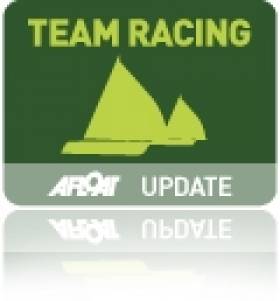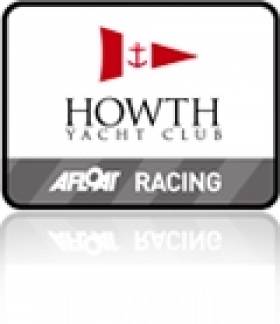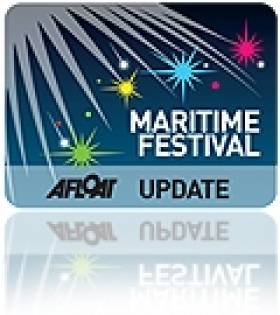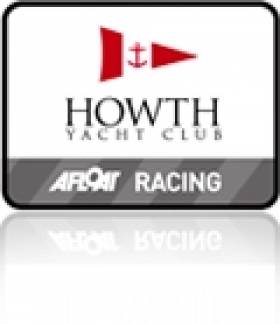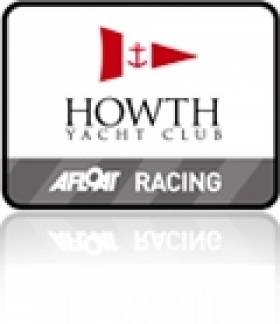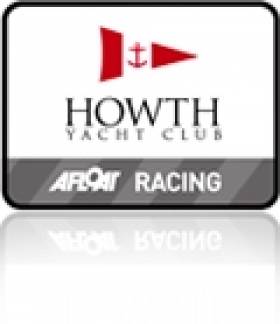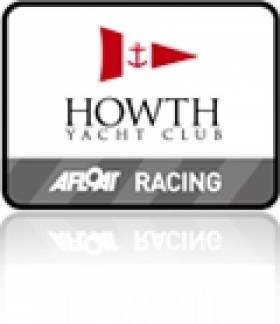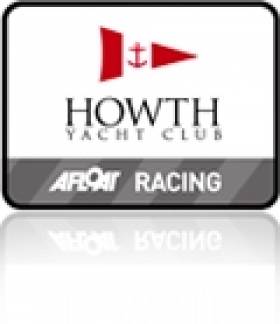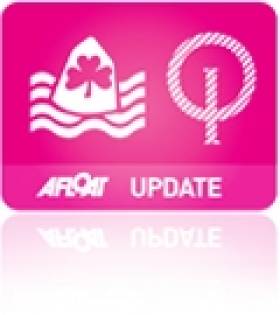Displaying items by tag: Howth Yacht Club
Howth Yacht Club & Royal St. George Team Racers To Represent Ireland At Wilson Trophy
#teamracing – This year Irish team racing hopes of success at the Wilson trophy rest on the shoulders of Howth Yacht Club and the Royal St. George YcC The highlight of the team racing calendar is next month when the top team racing nations make the journey to West Kirby to compete for the coveted trophy from 9 - 11 May.
HYC will be represented by Simon Rattigan, Geoff Tait and Darragh O'Connor as helms and Lynn Reilly, Lisa Tait and Emma Geary as respective crews. The team have been training hard this year and have shown good results in recent events - finishing in 2nd place in the Irish Team Racing Nationals and 1st place in the Trinity Invitational Trophy. A strong performace at The Wilson will certainly round off good season for HYC.
There will also be a Royal St George team competing at the Wilson Trophy, to be captained by Marty O'Leary - maintaining the tradition that dates back to the first ever edition of this event.
The Wilson Trophy, hosted by the infamous West Kirby Sailing Club, is the most prestigious team racing event in the world attracting 32 of the most competitive International teams. It is the most sought after prize within the world of team racing, in which HYC aims to continue to build a strong presence.
The team is targeting a quarter-final placing having narrowly missed out on this in the last number of editions
#quarterton – Hot on the heels of its Sportsboat Cup announcement for June, busy Howth Yacht Club in North Dublin has today announced that its Class 2 and 3 East Coast Championships scheduled for August will incorporate the Irish Quarter Ton Cup. Running over the 16th and 17th August, the two day event is sponsored by Euro Car Parks.
The Quarter tonners are looking forward to a busy season with participation at Dublin's ICRA Nationals in June from June 13–15 in Dun Laoghaire before heading across the bay to Howth for the Sportsboat Cup from June 20 to 22 and then the Quarter Ton Championships itself in August.
A class event poster and the notice of race is available to download below.
Great Food, Great Fun At Howth's Dublin Bay Prawn Festival
#MaritimeFestivals - It's April, which means it's almost time for the annual Dublin Bay Prawn Festival - running this year from Friday 25 to Sunday 27 April.
Whatever way you like your prawns – barbecued, whole, shelled, fried, skewered, marinated or sauced – Howth’s many award-winning restaurants will serve your favourite prawn dishes in bite-sized portions at the Food Village adjacent to Howth Yacht Club.
But the food is just one part of a whole programme of events over the weekend that includes a mystery dine-around, historic walking tours of the North Dublin fishing village, and a 'Prawn Push' in aid of Howth RNLI.
And just like last year, Dublin Bay Cruises will be running special trips to Howth, this time from the city centre - so you can arrive at the festival by sea!
Full details of this year's Dublin Bay Prawn Festival are available on the official website HERE.
Is Optimist Competition Pushing Kids Too Hard?
#opti – As Ireland prepares to welcome a record fleet of youngsters to the Optimist dinghy European Championships in Dun Laoghaire in four months time, Afloat.ie reader David Quinn questions the level of intensity of this winter's training and asks is this developing a life long love for sailing, or creating the environment where a tiny minority can push for Olympic Glory, while the rest take up another sport?
I live close to the Harbour in Howth, County Dublin so I tend to walk the pier or drive past the Yacht Club most weekends. This winter, much more than previous years, I have become really bothered and concerned at the extent of winter junior training sessions, particularly with the Optimist Class.
I started sailing relatively late so don't have much knowledge or experience of the Optimist Class. I started out in Mirrors before moving to Standard Rig Lasers. We trained hard, as an informal group, in Howth and competed internationally, but this was only in our late teens and early twenties. It is noticeable how many of my peers from that time are still sailing now and have a great love for the sport. I put that down to the huge fun we had racing Mirrors in Sutton Dinghy Club and at Regional events.
The major issues facing our sport are the fall off in memberships, declining activity and the lack of youth members in our clubs. I think a close scrutiny of the Optimist class would go some way to explaining some of the underlying problems in our sport!
I don't have an exact count, but the Optimists must have done at least four intensive training weekends, each with six hours of training per day. I'm not involved in the class so I can't be certain of the timing or intensity, but they seemed to launch before 10am and finish at dusk most days. I'm sure they came in for lunch. Is this developing a life long love for sailing, or creating the environment where a tiny minority can push for Olympic Glory, while the rest take up another sport?
I know some in the ISA are very concerned with this level of intensity for such young sailors, but the class, driven by over-ambitious parents, takes no notice. I doubt this is developing a life-long love for the sport, and I doubt it is even encouraging the kids to become elite sailors.
Maybe 1/100 will make it to senior international funded sailing? I would love to see a wider debate on the subject? I know when I was in my teens I sailed Mirrors and had a ball. It wasn't exactly an elite pathway class, but most of my peers from those days still race and sail very actively 25 years later. There must be a lesson there and it would make for an interesting study?
David Quinn (40) is a Laser and SB20 Sportsboat sailor from Howth Yacht Club and a former racing manager of the ISA.
Healthy Turnout For Howth YC's Round Island Race
#HYC - Howth Yacht Club has a round-up of all the action from the Round Island Race on Saturday 15 March, with the wind's turbulence making for a tough day's sailing around Ireland's Eye.
But in spite of the poor weather forecast, a healthy total of 31 boats took part in the St Patrick's weekend event, including many Laser Radials and 4.7s - and all were challenged by conditions that varied from 17-knot breeze to strong gusts.
The HYC website has all the details and results HERE.
Cull Beats Craig for Laser Howth Honours
#hyc – Sailors were greeted with a stiff 12 to 15 knot Southerly, as the sun slowly but surely managed to break through the clouds in what proved an eventful last day of Howth Yacht Club's laser series on Sunday.
Two races were sailed back to back, with the tide dictating the tactics on the start line and subsequent beats. Despite the busy Committe boat end the fleet had a clean start as most of the sailors tacked early out to the right. For those who fancied their luck on the left side of the course could only watch as the Starboard tackers crossed in front by a country mile. Conor Murphy of Malahide, fresh from his win at the IUSA Intervarsities,led this race from start to finish in what was a deserving win, despite the efforts of Paul McMahon who was in hot pursuit!
The strong flood tide reassured sailors that there was only one way to sail the beat, and that was to head for the Starboard layline. Again, the fleet got away cleanly and most tacked immediately out to the right. Ronan Cull led from Sean Craig at the WW mark and the two managed to hold their positions to the end.
The overall standings for the Standard Rig: 1st Place - Ronan Cull; 2nd Place - Sean Craig; 3rd Place - Colm Cunningham
In the Radial, Aoife Hopkins took first prize to round off a successful Winter season.
Next week will officially conclude proceedings with the Annual Round the Island race, and here at Howth we're hoping for a great turnout once again from near and far.
This year will also see the RS 400 fleet join in on the fun, so hopefully the weather holds out!"
#hyc– A more civilised wind forecast greeted the Howth Frostbite sailors last Sunday, with a Fresh SSE at 15knots made for an enjoyable two races in the rain. The Race Committee (RC) ran two great Olympic course races for the 16 sailors who made it to the start line.
Race 1 saw an early start with most of the fleet over the line due to the turning ebb tide.
After a General Recall, the fleet got away successfully with a Committee boat favoured start line. Those who started near the RC boat were able to climb over those further down the line in a lifting gust out to the Port lay line. Racing was tight up the first beat on this occasion with the top five boats rounding within seconds of each other at the top mark.
A tricky cross swell on the run made for a few capsizes and those who stayed in the gusts on the left side of the downwind run made significant gains. Paul McMahon took line honours after fending off several chasing sailors.
Race two got underway with a Port favoured line with the leaders coming off the pin sailing to the left side of the course. Paul McMahon, once again took the initiative by putting some good distance between himself and the chasing pack on the reaches.
The Final race day of the series is next Sunday so we're hoping for a big turnout!
Howth Yacht Club Laser Sailors Get the Better of Sunday's Storms
#hyc – Although the general forecast was for meteorological mayhem throughout Ireland on Sunday, Howth Yacht Club's Laser Frostbite Race Officer Liam Dineen reckoned that an expected but brief mid-morning patch of softer winds, coupled with the fact that it was low water to maximise shelter in the Sound inside Ireland's Eye, provided a small window of opportunity for some much-needed sport.
Admittedly, of the 43 regular entries in the Howth winter series (which has been a hardy annual since 1974), only eleven came to the line to challenge a shifty southerly which was 21 knots gusting 26, though it felt much stronger owing to the exceptional density of the mid-February air.
In fact, at one stage the breeze was recording as low as 16 knots. But most of the time it was a morning for screaming reaches, hairy gybes, and a couple of spectacular capsizes. At the front of the fleet, veteran Lasermen Mike Evans and Stephen Quinn had a head to head throughout the one race sailed before conditions closed down again, and at the finish it was Quinn in the lead with Evans still hounding him.
All agreed that with the weather we've had this winter, an hour of superb sailing in February sets you up every bit as well as a whole day of sunshine sport in high summer. The Howth fleet are looking forward to their final two weekends with this popular series, which attracts Laser frostbite enthusiasts from all along the east coast of Ireland.
They're anticipating a big turnout for their traditional concluding race round Ireland's Eye on Saturday March 15th, a highlight of the St Patrick's Weekend. It's an open event, and not restricted solely to those who have completed the Frostbite Series. The entry fee includes the legendary Laser Lunch which morphs seamlessly into the afternoon's rugby match. Details later this week on hyc.ie
Howth's Sailing Story to Finance Fiddles
#hyc – By popular demand, Afloat.ie blogger W. M. "Winkie" Nixon's light-hearted take on "The Story of Howth Sailing" is having a new performance with an enhanced version which now includes historic sailing film material.
It's scheduled for next Wednesday, February 26th, at 7.30pm, and this time it's in Howth Yacht Club. All are welcome, and admission is €15 as all proceeds are going to the St Agnes Youth Orchestra funding programme run by Jimmy Kinahan of Poolbeg Y & BC.
Irish Optimist Youth Sailing Season Already Underway
#optimist – Yesterday Optimist sailors in Cork and Dublin were packing a punch into training in Cork and Dublin writes Claire Bateman. Royal Cork YC members of the Irish Optimist Squad were training at Howth Yacht Club and other RCYC squad members were training in Cork Harbour where they presented a spectacular sight as they appeared to be literally flying up and down and around in a stiff W/SW bitingly cold breeze in the immediate vicinity of the club.
Next week Optimist training will move to Baltimore for the mid term schools break and sailors will spend the full week undergoing rigorous coaching and workouts. It also provides the opportunity for a mid term family break for other members of the families as they generally move to Baltimore for the week.
This is an extremely important year for the Optimist Class as the European Championships 2014 will take place in Dublin. A decision has been taken not to compete in the World Optimist Championships 2014 but to concentrate wholly on the European Championships. Obviously the venue is very accessible for the Irish sailors and will give some extra competitors the chance to participate where they might not have been able to access the Worlds at some far lung venue.
The Royal St. George Club will host the Europeans from July 12th to 20th, 2014 and credit for securing the event for the country must be given to Frank O'Beirne of RStGYC. This means that Ireland as the host nation will have fourteen places instead of the usual seven.
Following the Worlds, Optimist action will move on to the CH Marine Irish Optimist Nationals and Open Championship to be hosted by the Royal Cork Yacht Club from August 14th to 17th, 2014.


























